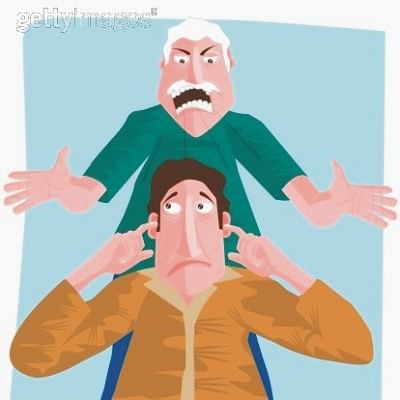Culture of finger-pointing

Photo: GLOWIMAGES
As a people we appear to be very self-critical. Whenever we come across anything outrageous being committed by our fellow people, the common reaction of the observer is: what else can we expect of a Bangalee? However, such an attitude of being self-critical is limited only to the cases where one is pointing the finger at the other person or to something abstract such as the nation or the people in general. But when it comes to taking the responsibility individually, then no one would be found around to shoulder it. Individually, we are all infallible.
The debates we see in parliament or at the talk shows, which have become so popular nowadays in the electronic media, especially, between representatives of the two major political camps that divides the nation down the middle, are all centred on blaming the other camp for all the evils on earth. This has created the culture of making the other party the sole scapegoat for all the past misdeeds and mistakes in an attempt to pull the wool over the public's eyes about the failures and follies of the incumbent in office. So, pointing a finger at other is a very convenient ploy to avoid one's own responsibility or rebuff any criticism made by the adversary.
That is, in neither case are we demonstrating our ability to place the one in the first personthe narrator or the finger pointerto accept responsibility for the event or action under scrutiny.
But there is another dimension to our inabiliility to accept criticism or responsibility and pointing the finger at others. That is reflected through our incapacity, except in few instances, to give credit due to others. Which is why Dr. Akbar Ali Khan, former adviser to caretaker government has suggested that we need a cultural movement to change our outlook so that we are able to properly evaluate other people's achievements and recognise those. This kind of soul-searching or cultural regeneration is necessary not only for its own sake, but also, as Dr. Khan emphasised, to ensure that we may not give the wrong impression to the rest of the world that we are a mean people.
A comparison with some of our immediate neighbours and other successful economies of Asia is enough to show where we are lagging behind. Even our neighbouring India, which shares an identical history and cultural tradition with ourselves, has made its mark among the community of nations as a successful democracy and economy. Notwithstanding the fact that we have restored democracy a decade and a half back after a protracted struggle against autocracy, the nature of our political culture that was largely to blame in the past for the entry of extra-constitutional forces in politics has hardly undergone any change. Small wonder just two years back we had another experience of how the prevailing confrontational political culture created the condition for non-constitutional forces to usurp power. Who are to blame for such recurrent instances of intervention in our normal flow of constitutional politics that we had started with at the inception of our national independence? Was it not because we were very intolerant and unwilling to allow our democratic forerunners to give the time they were mandated by the people to perform?
In democratic parlance, the existence of more than one party with different ideologies is a historical reality. The essence of democracy is to accept this fact of life and at the same engage the opponent in a constructive engagement through debates and political discourses. That is how the culture of democratic politics evolved in our neighbouring India or even in Sri Lanka. It is not that these nations had always had a smooth sailing so far as the democratic essence of politics was concerned. They had also their share of slanging matches, name-calling and demagogy, Bit in spite of those unhappy experiences, the tradition of constitutional politics or democracy was never compromised. As a result, their political culture could go through their normal path of evolution and thereby become more refined and enriched with the passage of time. And it is due to this continuity that extra-constitutional forces could never desecrate their premises of national politics.
The psyche of a nation grows out of its own history. A nation becomes proud about itself, only when it can hold its national leaders and heroes in high esteem, when it can project before the world as a united nation. That is how many of our peers in the South and Southeast Asia have been doing. Even if we are to hold even some of our national heroes critically, we must do that in a way so that it does not present ourselves in a poor light before the rest of the world.
Unfortunately, there is much to be desired in that respect so far as our record goes.
To cut a long story short, we need to draw the line somewhere. Granted it is not possible to expect any big change for the better overnight. But we can at least be more tolerant about our political opponent. While being scathingly critical of our adversaries, be it in politics or in any other sphere of life, for their failures, we can at least develop the habit of recognising some of their good works. And for the sake of national unity, let us not at least be miserly about recognising the contribution of all those who were behind what we are today in every field of our national endeavour.
Syed Fattahul Alim is a Senior Journalist

 For all latest news, follow The Daily Star's Google News channel.
For all latest news, follow The Daily Star's Google News channel. 



Comments